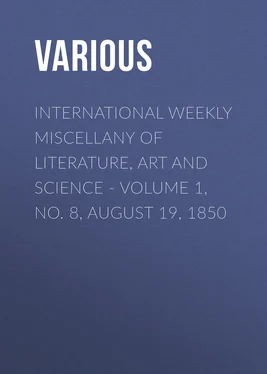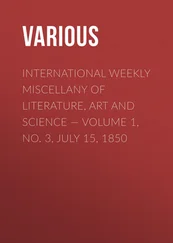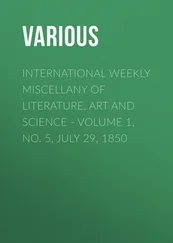Various - International Weekly Miscellany of Literature, Art and Science - Volume 1, No. 8, August 19, 1850
Здесь есть возможность читать онлайн «Various - International Weekly Miscellany of Literature, Art and Science - Volume 1, No. 8, August 19, 1850» — ознакомительный отрывок электронной книги совершенно бесплатно, а после прочтения отрывка купить полную версию. В некоторых случаях можно слушать аудио, скачать через торрент в формате fb2 и присутствует краткое содержание. Жанр: foreign_antique, periodic, foreign_edu, на английском языке. Описание произведения, (предисловие) а так же отзывы посетителей доступны на портале библиотеки ЛибКат.
- Название:International Weekly Miscellany of Literature, Art and Science - Volume 1, No. 8, August 19, 1850
- Автор:
- Жанр:
- Год:неизвестен
- ISBN:нет данных
- Рейтинг книги:5 / 5. Голосов: 1
-
Избранное:Добавить в избранное
- Отзывы:
-
Ваша оценка:
- 100
- 1
- 2
- 3
- 4
- 5
International Weekly Miscellany of Literature, Art and Science - Volume 1, No. 8, August 19, 1850: краткое содержание, описание и аннотация
Предлагаем к чтению аннотацию, описание, краткое содержание или предисловие (зависит от того, что написал сам автор книги «International Weekly Miscellany of Literature, Art and Science - Volume 1, No. 8, August 19, 1850»). Если вы не нашли необходимую информацию о книге — напишите в комментариях, мы постараемся отыскать её.
International Weekly Miscellany of Literature, Art and Science - Volume 1, No. 8, August 19, 1850 — читать онлайн ознакомительный отрывок
Ниже представлен текст книги, разбитый по страницам. Система сохранения места последней прочитанной страницы, позволяет с удобством читать онлайн бесплатно книгу «International Weekly Miscellany of Literature, Art and Science - Volume 1, No. 8, August 19, 1850», без необходимости каждый раз заново искать на чём Вы остановились. Поставьте закладку, и сможете в любой момент перейти на страницу, на которой закончили чтение.
Интервал:
Закладка:
In conclusion, the Examiner observes—"We are not acquainted with any living author who could have written the Fool's Tragedy; and, though the publication is unaccompanied by any hint of authorship, we believe that we are correct in stating it to be a posthumous production of the author of the Bride's Tragedy; Mr. Thomas Lovell Beddoes. Speaking of the latter production, now more than a quarter of a century ago, (Mr. Beddoes was then, we believe, a student at Pembroke College, Oxford, and a minor,) the Edinburgh Review ventured upon a prediction of future fame and achievement for the writer, which an ill-chosen and ill-directed subsequent career unhappily intercepted and baffled. But in proof of the noble natural gifts which suggested such anticipation, the production before us remains: and we may judge to what extent a more steady course and regular cultivation would have fertilized a soil, which, neglected and uncared for, has thrown out such a glorious growth of foliage and fruit as this Fool's Tragedy."
The following exquisite lyric is among the passages with which these judgments are sustained:
"If thou wilt ease thine heart
Of love and all its smart,
Then sleep, dear, sleep;
And not a sorrow
Hang any tear on your eyelashes;
Lie still and deep
Sad soul, until like sea-wave washes
The rim o' the sun to-morrow,
In eastern sky.
But wilt thou cure thine heart
Of love and all its smart,
Then die, dear, die;
'Tis deeper, sweeter,
Than on a rose bank to lie dreaming
With folded eye;
And then alone, amid the beaming
Of love's stars, thou'lt meet her
In eastern sky."
WINTHROP MACKWORTH PRAED
Praed, it has always seemed to us, was the cleverest writer in his way that has ever contributed to the English periodicals. His fugitive lyrics and arabesque romances, half sardonic and half sentimental, published with Hookham Frere's "Whistlecraft" and Macaulay's Roundhead Ballads, in Knight's Quarterly Magazine , and after the suspension of that work, for the most part in the annual souvenirs, are altogether unequaled in the class of compositions described as vers de societie .—Who that has read "School and School Fellows", "Palinodia", "The Vicar", "Josephine", and a score of other pieces in the same vein, does not desire to possess all the author has left us, in a suitable edition? It has been frequently stated in the English journals that such a collection was to be published, under the direction of Praed's widow, but we have yet only the volume prepared by a lover of the poet some years ago for the Langleys, in this city. In the "Memoirs of Eminent Etonians," just printed by Mr. Edward Creasy, we have several waifs of Praed's that we believe will be new to all our readers. Here is a characteristic political rhyme:
VERSES
Sleep, Mr. Speaker, 'tis surely fair
If you mayn't in your bed, that you should in your chair.
Louder and longer now they grow,
Tory and Radical, Aye and Noe;
Talking by night and talking by day.
Sleep, Mr. Speaker, sleep while you may!
Sleep, Mr. Speaker; slumber lies
Light and brief on a Speaker's eyes,
Fielden or Finn in a minute or two
Some disorderly thing will do;
Riot will chase repose away
Sleep, Mr. Speaker, sleep while you may!
Sleep, Mr. Speaker. Sweet to men
Is the sleep that cometh but now and then,
Sweet to the weary, sweet to the ill,
Sweet to the children that work in the mill.
You have more need of repose than they—
Sleep, Mr. Speaker, sleep while you may!
Sleep, Mr. Speaker, Harvey will soon
Move to abolish the sun and the moon;
Hume will no doubt be taking the sense
Of the House on a question of sixteen pence.
Statesmen will howl, and patriots bray—
Sleep, Mr. Speaker, sleep while you may!
Sleep, Mr. Speaker, and dream of the time,
When loyalty was not quite a crime,
When Grant was a pupil in Canning's school,
And Palmerston fancied Wood a fool.
Lord, how principles pass away—
Sleep, Mr. Speaker, sleep while you may.
The following is a spirited version of a dramatic scene in the second book of the Annals of Tacitus:
ARMINIUS
Back, Back;—he fears not foaming flood
Who fears not steel-clad line:—
No warrior thou of German blood,
No brother thou of mine.
Go earn Rome's chain to load thy neck,
Her gems to deck thy hilt;
And blazon honor's hapless wreck
With all the gauds of guilt.
But wouldst thou have me share the prey?
By all that I have done,
The Varian bones that day by day
Lie whitening in the sun;
The legion's trampled panoply
The eagle's shattered wing.
I would not be for earth or sky
So scorned and mean a thing,
Ho, call me here the wizard, boy,
Of dark and subtle skill,
To agonize but not destroy,
To torture, not to kill.
When swords are out, and shriek and shout
Leave little room for prayer,
No fetter on man's arm or heart
Hangs half so heavy there.
I curse him by the gifts the land
Hath won from him and Rome.
The riving axe, the wasting brand,
Rent forest, blazing home.
I curse him by our country's gods,
The terrible, the dark,
The breakers of the Roman rods,
The smiters of the bark.
Oh, misery that such a ban
On such a brow should be!
Why comes he not in battle's van
His country's chief to be?
To stand a comrade by my side,
The sharer of my fame,
And worthy of a brother's pride,
And of a brother's name?
But it is past!—where heroes press
And cowards bend the knee,
Arminius is not brotherless,
His brethren are the free.
They come around:—one hour, and light
Will fade from turf and tide,
Then onward, onward to the fight,
With darkness for our guide.
To-night, to-night, when we shall meet
In combat face to face,
Then only would Arminius greet
The renegade's embrace.
The canker of Rome's guilt shall be
Upon his dying name;
And as he lived in slavery,
So shall he fall in shame.
CAMPBELL AND WASHINGTON IRVING
The Editor of The Albion , in noticing the republication by the Harpers of the very interesting Life and Letters of Thomas Campbell, by Dr. Beattie, has the following observations upon Mr. Irving's introductory letter:
"WASHINGTON IRVING, at the request of the publishers, contributed a very interesting letter to themselves, directing public notice to the value of this edition. He pays also a hearty and deserved tribute, not only to the genius of Campbell, but to his many excellencies and kindly specialities of character. The author of "Hohenlinden," and the "Battle of the Baltic" stands in need of no man's praise as a lyric poet—but this sort of testimony to his private worth is grateful and well-timed. Here is an interesting passage from Mr. Irving's introductory communication. He is alluding to Campbell's fame and position, when he himself first made Campbell's acquaintance in England.
"'I had considered the early productions of Campbell as brilliant indications of a genius yet to be developed, and trusted that, during the long interval which had elapsed, he had been preparing something to fulfill the public expectation; I was greatly disappointed, therefore, to find that, as yet, he had contemplated no great and sustained effort. My disappointment in this respect was shared by others, who took the same interest in his fame, and entertained the same idea of his capacity. 'There he is cooped up in Sydenham,' said a great Edinburgh critic to me, 'simmering his brains to serve up a little dish of poetry, instead of pouring out a whole caldron.'
Читать дальшеИнтервал:
Закладка:
Похожие книги на «International Weekly Miscellany of Literature, Art and Science - Volume 1, No. 8, August 19, 1850»
Представляем Вашему вниманию похожие книги на «International Weekly Miscellany of Literature, Art and Science - Volume 1, No. 8, August 19, 1850» списком для выбора. Мы отобрали схожую по названию и смыслу литературу в надежде предоставить читателям больше вариантов отыскать новые, интересные, ещё непрочитанные произведения.
Обсуждение, отзывы о книге «International Weekly Miscellany of Literature, Art and Science - Volume 1, No. 8, August 19, 1850» и просто собственные мнения читателей. Оставьте ваши комментарии, напишите, что Вы думаете о произведении, его смысле или главных героях. Укажите что конкретно понравилось, а что нет, и почему Вы так считаете.












